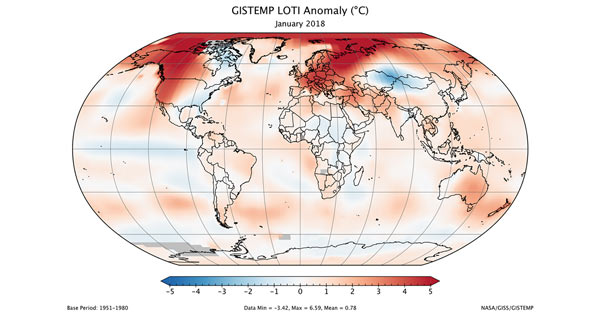 The warming of the Earth each year has become a common affair. Every year there is an increase in earth’s surface temperatures as the earth continues to follow a warming trend each year. Year 2017 has already been recorded as the second warmest year while 2016 continues to take the top spot.
The warming of the Earth each year has become a common affair. Every year there is an increase in earth’s surface temperatures as the earth continues to follow a warming trend each year. Year 2017 has already been recorded as the second warmest year while 2016 continues to take the top spot.
This was already alarming enough, and NASA’s latest report has created more worries in terms of warming of the Earth’s surface temperatures. As per NASA's Goddard Institute for Space Studies (GISS) in New York, January 2018 was the fifth warmest January since 1880, i.e. when records began. Due to La Niña conditions, there was some cooling. Had it not been the case, it would have been a much warmer January.
January 2018 was about +0.78°C warmer than the average temperatures. Januarys warmer this were in 2017 (+0.97°C), 2016 (+1.16°C), 2015 (+0.81°C), and 2007 (+0.95°C), the warmest being January 2017. As far as the East Coast of North America is concerned, it was 1-2 degrees Celsius below the normal levels while the entire continent was a whopping 5 degrees warmer than usual.
Usually, the month of January is the coldest for the Northern Hemisphere especially for the mid latitude areas. During this time, more weather systems are present around the globe in the form of winter storms, snow storms, Western Disturbances and a few others affecting areas and gaining strength as they travel across the seas.
[yuzo_related]
The Northern Hemisphere which sees winters during this time has way more landmass chunk as compared to the Southern Hemisphere. Thus, contributors present for warming and increase in pollution levels are more over the Northern side. The Southern Hemisphere sees summer conditions during this time.
Thus, if the month of January has seen the first warmest January in 138 years despite La Niña conditions since a couple of months, the situation is quite alarming.
Image Credit: NASA


